From a Humble Amish Childhood to an Education that Spans the Globe
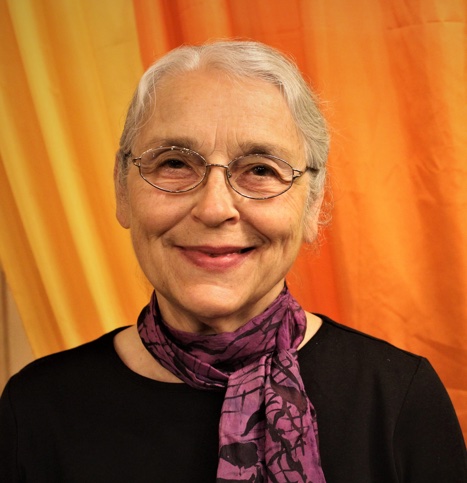
This is a bit later than I expected to be publishing the second story in the series I started in my last blog post, but I feel it was worth waiting for. Today I bring you the story of Esther Yoder Stenson, who grew up in Stuarts Draft, Virginia. I first met Esther in 2017 when I attended a conference at Eastern Mennonite University called “Crossing the Line.” Since then we have been in the same writing group where we shared chapters of our respective memoirs. Her adventurous spirit has led her to faraway places and to prestigious universities. She spent eight years of her life outside the United States. She taught in El Salvador from 1974-77 and taught English in China for five years. China introduced her to her Minnesota husband, David. She is the author of a memoir Doors through the Great Wall (published by Masthof Press) a collection of poetry, Miracle Temple (published by Cascadia Press), a book on Simple Amish Gardening (published by Publications International) as well as other self-published documents. She continues to enjoy creative writing and family history, as well as gardening.
Here is Esther’s story in her own words:
I grew up in Stuarts Draft, Virginia in an Amish church that would have been called “New Order” before that term was used. This relatively new community was established in the early 1940s by Old Order Amish coming from other, older, Amish communities. While our church still used horse and buggy, we had our own church house.
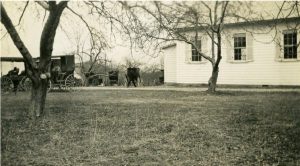
Photo courtesy of Mennonite Archives of Virginia
I had only two siblings, and all of us left the Amish church, but my sister returned to our farm and a Beachy Amish Mennonite church after having lived elsewhere. Though I was twenty years old when I left, it might be more accurate to say that the church left me. Most of the youth had already left, as had many others, and the bishop was on his death bed. It was no longer safe to drive horse and buggy on our roads, and the attraction of driving cars was strong. Thus, several new congregations were formed that allowed the use of automobiles, but they were still rather conservative.
My brother, who had left the Amish earlier and attended college, was the single most influential person in causing me to seek higher education. He always encouraged me to learn new things, and he openly disdained ignorance. While I was still Amish, I relished exploring the books he brought home from college. However, with four years of teaching in a parochial school and nearly three years in El Salvador after I joined a Beachy Amish congregation, college was put on the back burner but never completely dismissed.
Several winters after I returned from El Salvador, I attended a Bible school for youth of conservative Mennonite and Beachy congregations. There, I met a young woman who was planning to begin her college career and who encouraged me to think about joining her. In addition, I met several older single women for supper one night. They were all engaged in the demanding task of caring for their elderly parents, and they said, “If there is anything special that you want to do, do it now!” the implication was that if I let the years go by without pursuing my dream, the time could come when it would no longer be feasible. Thus it was that I applied to a Presbyterian college in Kansas for the following fall term.
Before I could enter college, however, my home congregation took a vote on whether I should be permitted to do so. I don’t remember that anyone strongly objected. The church was always in need of good teachers, and I had already served as a teacher for seven years, so perhaps they thought I was committed to serving further. My parents had already seen my brother off to college and seemed proud that he had become a doctor, so they did not raise any objections. In fact, my mother, the oldest girl in a family of fourteen, said that she cried when she had to quit school after the eighth grade as she loved going to school. She was the one who would spend time reading magazines, the newspaper, and other print materials. She liked to know what was happening in the world.
It was not until my third year in college that I received a letter from the bishop in Virginia asking that I stop singing with the college touring choir, as someone had raised objections to my singing with that choir. The stated reason was that it would take me away many Sundays from worshiping in the Beachy congregation in the nearby community. Instead, I would be attending many Presbyterian congregations, and perhaps I would be drawn away from the Beachy church. That nearly broke my heart. I loved singing, and my friends were in that choir. As a result of that stress, I developed a series of fever spells throughout that spring. If anything, that kind of heavy-handed triangulation nearly drove me from the church, though I remained for some years longer.
Besides my brother, a few cousins who were in more liberal churches also attended college, and I looked upon them with envy. I had attended public school through seventh grade, and I was sad that I could not go with my classmates to public high school, which would automatically have prepared me for college. However, I did complete high school with a combination of parochial and correspondence classes, which allowed me to pass the GED and SAT exams required for entry to college. My SAT scores were high enough to earn me an academic scholarship, but I did not have the courage to enter college at that time.
Instead of attending college, I was asked to teach school for our church, so I did that for several years. During those years, I made friends with a local public school teacher whose husband was attending law school at the University of Virginia. They encouraged me to seek further schooling saying, “You can be anything you want to be!” When I finally did go to college, I received support from a family where the man was my father’s best friend. They allowed me to board with them for several years at minimal cost. One of their daughters was in midwifery school, and other youth from that Beachy Mennonite community either had attended, or were attending Sterling College where I studied. We regularly carpooled and had good times chatting along the way.
Financially, I had saved enough money to cover the cost of my freshman year. Otherwise, I received some financial aid in the form of grants and scholarships, and worked summers. My father also loaned me one thousand dollars, which I repaid by working in a greenhouse the spring after I graduated. The cost of a college education at that time was nowhere near what it is today.
Although I loved literature, I decided to pursue the “safe” major of elementary education. While on a field trip to Kansas City, our class got to observe a classroom of children who were immigrants and refugees studying English. Having been the only Amish girl in my own elementary classes, I felt an immediate kinship and knew that I wanted to teach non-native speakers at some point. Like them, I had not had a good grasp of English when I entered first grade.
Thus, in the summer after I graduated, instead of taking a decent-paying conventional teaching job in my own country, I volunteered to teach a year in northeastern China with a non-denominational Christian organization. I was still a member of my home Beachy Amish Mennonite congregation, and they graciously helped me raise the funds I needed to go abroad. Without a college degree, I could not have embarked on this adventure that ended up truly changing my life.
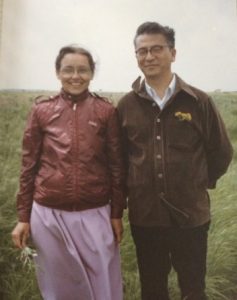
1984 with the vice president of the university where I was teaching in Northeast China.
It was during this year that I was inspired to return to the U.S .and pursue a master’s degree in applied linguistics. With the help of relatives and friends living in northern Virginia, I was able to get a grant that allowed me to afford that additional degree, after which I was able to teach in both an elementary school and nearby community colleges. During this time, I also joined a more diverse and open Mennonite congregation. While I could have remained in the northern Virginia/DC area and spent the rest of my life with a full-time teaching job, I felt that Someone or something was calling me back to China.
Thus, five years after that first experience, I returned to volunteer teach in China again. To put it simply, I spent another four eventful years in China. It was there that I met the good man from Minnesota who became my husband and made it possible for me to feel welcomed into another warm family circle. In addition, those years of teaching, along with my master’s degree, allowed me to teach both native and non-native speakers of English at a university upon returning from China, which led to the fulfillment of an earlier interest.
During my years at James Madison University, I was able to earn a second master’s degree—this time in literature and creative writing. With this degree, I was able to publish some poetry and teach classes in the English department. As a woman then in her middle age, what I gained from those teaching and learning experiences was golden.
Now, mostly retired, I still like to dabble in writing and think about how the literature I taught speaks to current situations. I also do some tutoring for refugees and immigrants, understanding how important it is to help open doors for those who have faced incredible trauma and need to rebuild their lives. I am deeply grateful for the opportunities presented to me, and that somehow God gave me the courage to seize those opportunities by faith.
To those longing for more formal education, I would say, keep your heart and mind open. Never think that doors are closed permanently. You have been given life to fill a niche that no one else can. While you may not have family or parents as gracious as mine, only you can make the decisions that will make your one life richer and fuller. Pray for courage, and keep your eyes open to see what surprises may await.
Esther Stenson, author of Doors through the Great Wall
If you would like to know more of Esther’s life and educational journey, I highly recommend reading her memoir, Doors Through the Great Wall. If you want to leave questions for her here on this blog, feel free to do so.
In my next blog post I will take a quick break from this series to make an announcement. Stay tuned!
Recent Posts
To order a signed copy of my book(s), click on an image below. You will be taken to the books page of my author website to purchase.
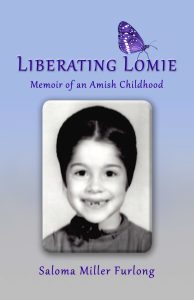
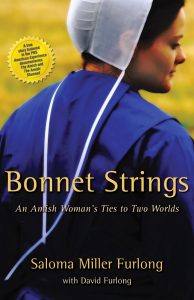
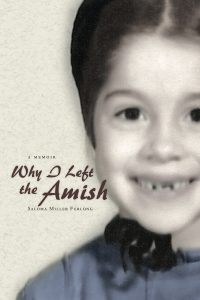
Great story. Very inspiring. Thanks so much for sharing.
You’re welcome, Marye, and thank you for reading. It is always good to see you here!
What a remarkable woman. Her support network was amazing! Thank you for sharing this story.
Thank you, Denise. If you know Esther, you understand she invites (and becomes part of) a support network. She is the embodiment of the term, you might say.
Thank you for stopping by. So good to hear from you!
I was glad to read Esther’s story in its entirety! As the third member of the writing group, along with Saloma, I’ve heard the various parts, but would have had trouble putting them all together chronologically. Esther is truly a courageous and adventurous person who keeps letting herself be challenged by new things. Thanks, Salome, for providing this space for her to tell her story.
Kathie, you’re welcome, and thank you for your comments. I agree with your sentiments.
Readers, Kathie Kurtz is the author of a memoir called The Blistering Morning Mist.. Lyrical and beautifully written, this is a book about overcoming the limits we place on ourselves. I highly recommend both Esther’s and Kathie’s memoirs.
Thank you Kathie! Your comments are always encouraging!
Esther worked in our office building at Mennonite Media with the China Educational Exchange program, I think they called it. It was great to hear more here about the rest of her life! Thanks and I hope to read her memoir sometime. Hi Esther!
Melodie Davis
Melodie, thank you for your comments. I hope you get to read her memoir!
Thank you for commenting, Melodie! I well remember you and the insightful articles you wrote. I wonder if or where you might be publishing currently?
What a surprise to see Esther ‘s story on here! I have known Esther all my life. I spent many hours at her family’s home. Theirs was a warm, friendly, welcoming home. Her sister worked for my mother, our mothers were good friends, as well as being in the same church family. Blessings to you, Esther!
How cool that you two know one another! Thanks for stopping by to let us know that.
Thank you for sharing the story of this remarkable woman!!!!! She was so brave to go after a different life for herself, something I’m sure wasn’t easy.
She reminds me of someone…..,hmmmmmm…… who could that be?????? SALOMA!!!!!!!!!!! 🙂
I can see how you two became friends, your definitely kindred spirits.
Thank you, Pamela, for your kind words for both Esther and me. It’s always good to see you here. Blessings to you and your family.